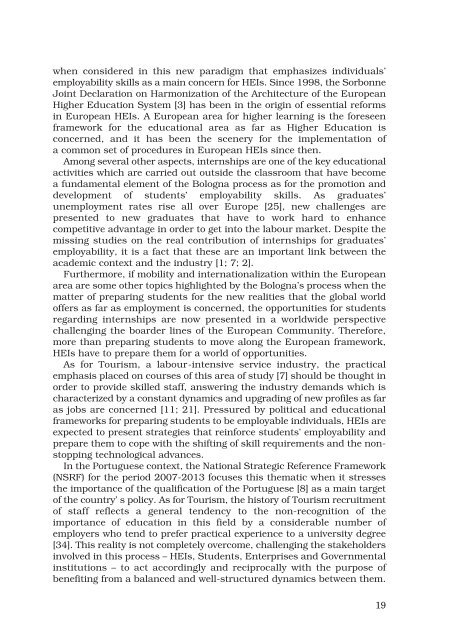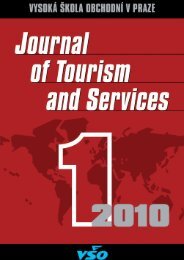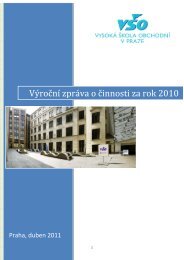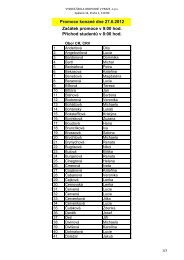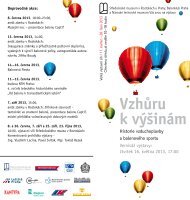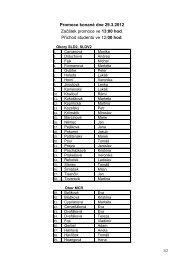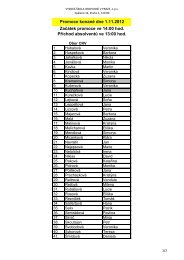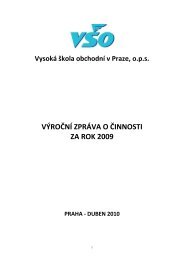Journal of Tourism and Services - Vysoká škola obchodnà v Praze
Journal of Tourism and Services - Vysoká škola obchodnà v Praze
Journal of Tourism and Services - Vysoká škola obchodnà v Praze
Create successful ePaper yourself
Turn your PDF publications into a flip-book with our unique Google optimized e-Paper software.
when considered in this new paradigm that emphasizes individuals’<br />
employability skills as a main concern for HEIs. Since 1998, the Sorbonne<br />
Joint Declaration on Harmonization <strong>of</strong> the Architecture <strong>of</strong> the European<br />
Higher Education System [3] has been in the origin <strong>of</strong> essential reforms<br />
in European HEIs. A European area for higher learning is the foreseen<br />
framework for the educational area as far as Higher Education is<br />
concerned, <strong>and</strong> it has been the scenery for the implementation <strong>of</strong><br />
a common set <strong>of</strong> procedures in European HEIs since then.<br />
Among several other aspects, internships are one <strong>of</strong> the key educational<br />
activities which are carried out outside the classroom that have become<br />
a fundamental element <strong>of</strong> the Bologna process as for the promotion <strong>and</strong><br />
development <strong>of</strong> students’ employability skills. As graduates’<br />
unemployment rates rise all over Europe [25], new challenges are<br />
presented to new graduates that have to work hard to enhance<br />
competitive advantage in order to get into the labour market. Despite the<br />
missing studies on the real contribution <strong>of</strong> internships for graduates’<br />
employability, it is a fact that these are an important link between the<br />
academic context <strong>and</strong> the industry [1; 7; 2].<br />
Furthermore, if mobility <strong>and</strong> internationalization within the European<br />
area are some other topics highlighted by the Bologna’s process when the<br />
matter <strong>of</strong> preparing students for the new realities that the global world<br />
<strong>of</strong>fers as far as employment is concerned, the opportunities for students<br />
regarding internships are now presented in a worldwide perspective<br />
challenging the boarder lines <strong>of</strong> the European Community. Therefore,<br />
more than preparing students to move along the European framework,<br />
HEIs have to prepare them for a world <strong>of</strong> opportunities.<br />
As for <strong>Tourism</strong>, a labour-intensive service industry, the practical<br />
emphasis placed on courses <strong>of</strong> this area <strong>of</strong> study [7] should be thought in<br />
order to provide skilled staff, answering the industry dem<strong>and</strong>s which is<br />
characterized by a constant dynamics <strong>and</strong> upgrading <strong>of</strong> new pr<strong>of</strong>iles as far<br />
as jobs are concerned [11; 21]. Pressured by political <strong>and</strong> educational<br />
frameworks for preparing students to be employable individuals, HEIs are<br />
expected to present strategies that reinforce students’ employability <strong>and</strong><br />
prepare them to cope with the shifting <strong>of</strong> skill requirements <strong>and</strong> the nonstopping<br />
technological advances.<br />
In the Portuguese context, the National Strategic Reference Framework<br />
(NSRF) for the period 2007-2013 focuses this thematic when it stresses<br />
the importance <strong>of</strong> the qualification <strong>of</strong> the Portuguese [8] as a main target<br />
<strong>of</strong> the country’ s policy. As for <strong>Tourism</strong>, the history <strong>of</strong> <strong>Tourism</strong> recruitment<br />
<strong>of</strong> staff reflects a general tendency to the non-recognition <strong>of</strong> the<br />
importance <strong>of</strong> education in this field by a considerable number <strong>of</strong><br />
employers who tend to prefer practical experience to a university degree<br />
[34]. This reality is not completely overcome, challenging the stakeholders<br />
involved in this process – HEIs, Students, Enterprises <strong>and</strong> Governmental<br />
institutions – to act accordingly <strong>and</strong> reciprocally with the purpose <strong>of</strong><br />
benefiting from a balanced <strong>and</strong> well-structured dynamics between them.<br />
19


